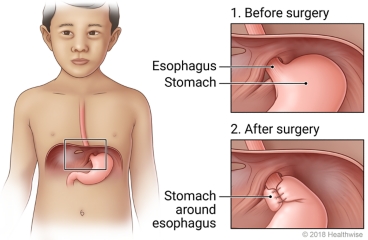Fundoplication Surgery in Children: What to Expect at Home
Your Child's Recovery

The doctor wrapped the upper part of your child's stomach (fundus)
around the lower part of the esophagus. This prevents stomach acid
from moving back into the esophagus.
Your child may be sore and have some belly pain for several weeks
after surgery. If your child had laparoscopic surgery, there may
also be some shoulder or back pain. This pain is caused by the gas
used to inflate the belly to help see the organs better. The pain
usually lasts about 1 or 2 days.
For up to 6 weeks after the surgery, it may be hard for your child
to swallow and burp. Your child may also have belly cramps, feel
bloated, or pass more gas than before. The cramping and bloating
usually go away in 2 to 3 months. But your child may pass more gas
for a long time.
Because the surgery makes the stomach a little smaller, your child
may get full sooner when eating. In 2 to 3 months, the stomach
adjusts and your child will be able to eat the usual amounts of
food.
How quickly your child recovers depends on whether your child had a
laparoscopic or open surgery. After laparoscopy, most children can
go back to their normal routine in about 2 to 3 weeks. After open
surgery, children may need a little longer to get back to their
normal routines.
This care sheet gives you a general idea about how long it will take
for your child to recover. But each child recovers at a different
pace. Follow the steps below to help your child get better as
quickly as possible.
How can you care for your child at home?

Activity

Diet
|
|
-
For the first week, give your child a liquid or soft diet.
This includes broths, soups, milk shakes, puddings, and
mashed potatoes. When your child can eat these, give your
child other foods that are easy to swallow, such as ground
meat, shredded chicken, fish, pasta, and soft vegetables.
|
|
|
|
|
|
|
|
|
-
Avoid crusty breads, bagels, pizza, tough meats like hot
dogs, raw vegetables, nuts and seeds (including crackers
and breads that have nuts and seeds), and other foods that
are hard to digest.
|
|
|
|
|
|
|
|
|
|
|
|
|
|
|
-
If your child's bowel movements are not regular right
after surgery, you can help your child to avoid
constipation and straining. Have your child drink plenty
of water. The doctor may suggest fiber, a stool softener,
or a mild laxative.
|

Medicines

Incision
care
Follow-up care is a key part of your child's treatment and
safety. Be sure to make and go to all appointments, and call your doctor
if your child is having problems. It's also a good idea to know your
child's test results and keep a list of the medicines your child
takes.
When should you call for help?
 Call 911 anytime you think you may need emergency care.
For example, call if:
Call 911 anytime you think you may need emergency care.
For example, call if:
Call your doctor now or seek immediate medical care if:
Watch closely for any changes in your child's health, and be sure to
contact your doctor if your child has any problems.
Current as of: July 26, 2023
Content Version: 14.0
Care instructions adapted under license by your healthcare professional. If you have questions about a medical condition or this instruction, always ask your healthcare professional. Healthwise, Incorporated disclaims any warranty or liability for your use of this information.